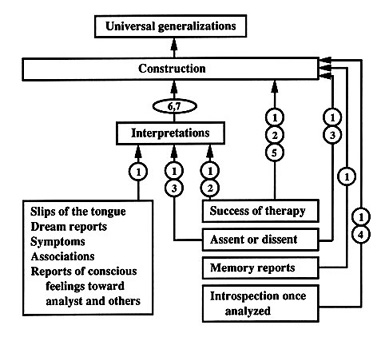Verbal assent may be "hypocritical," and thus untrustworthy, when it serves "to prolong the concealment of a truth that has not been discovered" (Freud, 1915, p. 262). Thus, "The 'Yes' has no value unless it is followed by indirect confirmations, unless the patient, immediately after his 'Yes,' produces new memories which complete and extend the construction" (p. 262).
Verbal dissent is almost always taken as untrustworthy, an indication of something other than genuine dissent. Dissent can arise not only from resistance, but also from incompleteness of the construction. Thus, dissent indicates the need for further psychoanalysis.
Assent/dissent is accepted as genuine only if there is inductive consilience of the verbal assent/dissent with new memories. Freud places far greater epistemic weight upon indirect confirmations or disconfirmations of analytic constructions than upon verbal assent or dissent.
The problem with the consiliance argument is that assent/dissent and indirect confirmations from the couch are not independent observations--rather, they are subject to a shared influence: the analyst's suggestion. A docile patient, upon assenting to the analyst's interpretation or construction, may well supply a confirmatory memory, just to be that much more agreeable to the analyst. All clinical data are subject to such contamination; thus, if indirect evidence is to be supplied for or against an interpretation or construction, then extraclinical data are required. Furthermore, Cioffi (1986) contends that, while the consilence argument (not the tally argument) is the mainspring of Freud's defense of his interpretive practice, the specimens of consilience put forward by Freud suffer a fatal flaw: they are simply poor storytelling.

LEVELS
PROBLEMS
Freud, S. (1915). A case of paranoia running counter to the psycho-analytic theory of the disease. In E. Jones (Ed.), Sigmund Freud: Collected papers, Vol. 2. New York: Basic Books.
Grünbaum, A. (1984). The foundations of psychoanalysis: A philosophical critique. Berkeley, CA: University of California Press.
Von Eckardt, B. (1986). Grünbaum's challenge to Freud's logic of argumentation: A reconstruction and an addendum. The Behavioral and Brain Sciences, 9, 262-263.
Last modified January 1999
Visited times since July 2001
Comments?
Home to Psychoanalysis
Home to Great Ideas in Personality